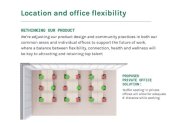Coworking businesses, which offer flexible, short-term leases on office space, have been hit hard and are weathering the coronavirus crisis, people from multiple companies in the industry told NBC10.
In some ways, the challenges they're facing now are no different than other sectors like tourism and hospitality: their business deals with people occupying physical space, in a time where people are not really visiting places beside their kitchens, living rooms and grocery stores. (Philly has 30 coworking spaces, according to Technical.ly.)
"Real estate is dependent on people using it," said Julie Whelan, who has studied and authored reports on the industry for firm CBRE. "If people aren't using it there's a sort of ebb and flow."
Experts and managers in the industry were always curious about how flexible lease terms would be at play in a recession or economic downturn. In many cases, tenant businesses, not bound by anything long-term and facing lost revenue, suddenly stopped paying.

For Alex Hillman - founder of Indy Hall, a coworking space and professional network at 4th and Market - it's been a month since closing the doors and moving things online.
Members' payments for the physical space are deferred until they can visit again. He had to ask the landlord of the space Indy Hall rents to give them a break - and posted the email he wrote to them on his blog.
"Ultimately these short term changes are impacting our revenue intensely and unpredictably, worsened by the extremely unclear timeline on any sort of government relief," he wrote. "Rent is our largest expense, and ultimately one we are not able to pay while we are closed due to these circumstances outside of our control."
Josh White, a managing director at MakeOffices - which has three locations in Philadelphia - said "pandemic economics" are at play, leading to cancelled or frozen leases as tenants have scattered back to working from home.
"There's certainly been an impact," he said. The company is trying to work with tenants in trouble, usually by offering deferred rent in exchange for a longer term.
One company paid their April rent, before realizing it would leave them behind on payroll. So MakeOffices returned the rent, White said.
People from multiple coworking companies said it was better to make deferral arrangements or other deals in the short term rather than hammer customers who can't make payments right now.
"Other [coworking] operators might be driving people to bankruptcy, but you're losing a customer forever then," White said.
MakeOffices remains open for any essential businesses who are tenants and closed to all others until further notice from government and health officials.
WeWork, the largest player in the industry, has just 5 of its 800+ locations in Philadelphia. A company webpage to track closures does not list any in North America.
The company is "striving to keep locations accessible for members, who rely on our spaces to remain operational," a spokesperson said in a statement. "We are speaking to members individually to understand how we can support them."
Hopes for Future
White said the first goal for MakeOffices when the coronavirus crisis started in the U.S. was to focus on retaining occupancy, ideally leading to a bounceback in revenue as soon as people could return to work.
But now, he's planning for the future when people can get back to work.
"What else are we going to do with our time?" he asked rhetorically.
He thinks the coworking spaces offer a good alternative to a traditional, large, established company that maybe owns its space, or is locked in a long-term office lease.
"It's not great to sit on an expensive building" that you can't even use, he said. The agreements some of the coworking spaces have been able to make have helped some tenants stay in business.
"If I'm in a cash-planning mode as a business owner, to be able to terminate rent within a month, that's huge."
Whelan, the CBRE analyst, said businesses with those short leases, "they're able to, much like a light switch, turn that on and off very quickly. ... It's easy to turn it back on, you can just in essence say 'OK, I'm ready to come into your location again.'"
So both are hopeful that demand will come roaring back when the U.S. can safely press play on its economy again. In the meantime, millions of Americans are working from home during the coronavirus pandemic, taking meetings online and doing video calls.
Hillman has been speaking with coworking leaders across the world in 20-minute interviews over the last few weeks. He spoke with managers in China and India, where the virus hit earlier and have had more time to think about reopening. It hasn't happened as quickly as some U.S. officials say it will here.
"The big question industrywide on these expenses is, I can weather it for a month or two but beyond that there’s serious trouble," Hillman said. "There are people who are comfortable figuring out a short-term fix, but the answer I don’t think anybody has, is how long are we doing this?"
In the meantime, Indy Hall is taking coworking online, launching a membership to keep its community group of freelancers and solo business-owners together. For $20 a month, members get access to educational workshops and a Slack network to bounce ideas off each other.
"All of us are stuck working from home, but you don't have to be alone," a video on the website says.
Another consideration tied to those big businesses coming to the coworking spaces involves the terms we all know well by now: distancing, sanitizing.
What Does 'Back to Normal' Look Like?
A WeWork planning document details some sample layouts that reduce occupancy and keep workers farther apart for safety. WeWork is among the densest of the coworking locations according to Bloomberg and the New York Times.

With companies thinking of revenue in terms of dollars per square foot, all companies are going to need to balance density concerns with cost concerns, Whelan said.
It may not mean totally revamping their spaces, considering the cost. It may mean removing some chairs and rethinking "hot desks" - a free space that any member could pop in and sit for a few hours before turning it over to someone else, White said.
One part of the WeWork document shows red X's over certain spots indicating that no two people will sit next to each other.
Tenant companies may also want to consider a flexible suite, a private area of a coworking space where tenants could set distancing rules themselves. Or adding a coworking space to keep workers spread out and not crowded in one flagship office.
All are committed to additional cleaning, with the WeWork document showing sanitizing wipe stations spread out through a property.
In the meantime, it's best to keep the current customers around and be reasonable.
"This is very short-term severe pain, if we all work through it together, if businesses look at the greater good...hopefully the rebound out of this is going to very strong," Whelan said.

